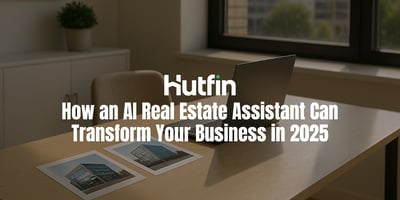Here's what's about to happen to real estate, and if you're not paying attention, you're going to...
The Rise of the AI Broker: How AI Is Rewriting Real Estate
Here's a question that should keep every traditional real estate broker awake at night: What happens when AI can analyze market data in seconds that would take you weeks to process, predict property values with 95% accuracy, and nurture leads 24/7 without ever taking a coffee break?
The answer isn't theoretical anymore. It's happening right now.
And if you're not adapting, you're about to become extinct.

The Numbers Are Staggering (And They Should Terrify Traditional Brokers)
Let me hit you with some data that'll make your head spin:
The global AI in real estate market is expected to reach $988.59 billion by 2029 at a 34.4% growth rate. But here's the kicker – brokers and services show the highest potential for automation gains, with a possible 34% increase in operating cash flow.
Think about that. A 34% increase in operating cash flow isn't just growth – it's a complete reshaping of the economics of real estate brokerage.
In 2024, the global AI real estate market was valued at USD 2.9 billion and is projected to skyrocket to USD 41.5 billion by 2033, growing at an impressive CAGR of 30.5%.
This isn't some distant future scenario. This is happening now, and the brokers who embrace AI aren't just gaining an advantage – they're creating an entirely new category of real estate professional.
What Exactly Is an AI Broker?
An AI broker isn't a robot in a suit showing properties. It's a new breed of real estate professional who leverages artificial intelligence to become superhuman at what they do.
Think of it this way: Traditional brokers rely on experience, intuition, and manual processes. AI brokers combine human expertise with machine intelligence to deliver results that would be impossible for either to achieve alone.
The AI Broker's Superpowers:
Instant Market Analysis Unlike traditional methods, AI can swiftly analyze vast amounts of data, such as market trends, historical sales, and property features, in seconds rather than hours.
While traditional brokers spend hours researching comparable sales, AI brokers get comprehensive market analyses instantly. They know exactly what every property in a neighborhood sold for, when, and why.
Predictive Property Valuation AI brokers don't just tell you what a property is worth today – they predict what it'll be worth tomorrow. Advanced algorithms analyze everything from local economic indicators to planned infrastructure developments to give clients insights that traditional brokers simply can't access.
24/7 Lead Nurturing AI chatbots and automated email sequences mean AI brokers are working while they sleep. They're qualifying leads, scheduling appointments, and building relationships around the clock.
Personalized Property Matching Instead of showing clients random properties, AI brokers use machine learning to understand exactly what each client wants – often before the clients know it themselves.
The Transformation is Already Happening
Some businesses are seeing a whopping 40% jump in how full their properties get and landlords are pocketing an extra 2% on their returns by plugging into tech like AI, IoT, and the cloud.
But the real transformation isn't just about better numbers – it's about completely reimagining what a real estate broker does.
Traditional Broker vs. AI Broker: The Reality Check
Traditional Broker Day:
- Manually research comparable sales
- Cold call leads one by one
- Show properties based on basic criteria
- Write offers using standard templates
- Wait for responses and hope for the best
AI Broker Day:
- Receive instant market reports with predictive analytics
- AI identifies and qualifies the hottest leads automatically
- Show properties selected by machine learning algorithms
- Generate personalized offers optimized for acceptance probability
- Get real-time feedback on negotiation strategies
The difference isn't just efficiency – it's effectiveness at a level that traditional methods can't match.
The Technologies Reshaping Brokerage
Generative AI: The Game Changer
In 2024, GenAI will enable more informed investment, pricing strategy, and development decisions and enhance tools for market trends and property valuations.
GenAI isn't just automating tasks – it's creating content, generating insights, and even writing personalized marketing materials for every single property.
Investment Decision Intelligence
AI tools are increasingly being integrated into investment decision-making with key use cases including market and asset-level analytics and forecasting, risk assessment, automated or enhanced valuations, and asset filtering and identification.
AI brokers aren't just selling properties – they're providing investment intelligence that helps clients make smarter financial decisions.
The Talent Explosion
Across the U.S. and Canada, the pool of tech workers with AI skills grew by more than 50% from mid-2024 to mid-2025 to 517,000 workers, concentrated in major markets like San Francisco, New York, Seattle, Toronto, and Washington.
This means the infrastructure and expertise to implement AI brokerage solutions is rapidly expanding.
The AI Broker Toolkit: What You Need to Know
Lead Generation and Qualification
AI systems analyze online behavior, social media activity, and search patterns to identify potential buyers and sellers before they even start looking for an agent. These systems score leads based on likelihood to transact and optimal timing for contact.
Automated Property Valuation Models (AVMs)
Modern AVMs don't just look at comparable sales – they analyze neighborhood trends, school district changes, local economic indicators, and even social sentiment to provide valuations that are often more accurate than traditional appraisals.
Predictive Analytics
AI can predict which properties are most likely to sell quickly, which neighborhoods are about to appreciate, and even which clients are most likely to refer business.
Virtual Assistant Integration
AI assistants handle initial client inquiries, schedule showings, send follow-up communications, and manage transaction timelines – all while learning and improving from every interaction.
Dynamic Pricing Strategies
Instead of static pricing, AI brokers use dynamic pricing models that adjust recommendations based on real-time market conditions, seasonal trends, and buyer behavior patterns.
The Skills Gap: Why Human Brokers Still Matter
Here's what the AI evangelists won't tell you: AI brokers aren't replacing human brokers – they're creating a new category that combines artificial intelligence with irreplaceable human skills.
What AI Can't Do (Yet):
- Build genuine emotional connections with clients
- Navigate complex family dynamics in real estate decisions
- Provide the reassurance and confidence clients need during major transactions
- Handle unique situations that fall outside algorithmic parameters
- Negotiate with the intuition and creativity that comes from human experience
What AI-Enhanced Brokers Do Better:
- Combine emotional intelligence with data intelligence
- Provide personalized service at scale
- Make faster, more informed decisions
- Deliver consistent results regardless of market conditions
- Continuously learn and improve their performance
The Business Model Revolution
The economics of AI brokerage are fundamentally different from traditional models.
Cost Structure Transformation:
Traditional Brokerage Costs:
- High labor costs for research and administrative tasks
- Significant time investment per transaction
- Manual marketing and lead nurturing
- Limited scalability without proportional cost increases
AI Brokerage Advantages:
- Automated research and analysis reduces labor costs
- Higher transaction volume per agent
- Automated marketing and lead management
- Scalable systems that improve efficiency with volume
Revenue Opportunities:
AI brokers can handle more transactions with better outcomes, leading to higher gross commissions and more referrals. They can also offer premium services like predictive market analysis and investment consulting.
Geographic Impact: Where AI Brokers Are Winning
The concentration of AI talent is creating geographic advantages for early adopters. Markets like San Francisco, New York, Seattle, Toronto, and Washington are seeing the fastest adoption of AI brokerage tools.
But here's the opportunity: Secondary markets with less AI adoption represent massive opportunities for brokers who implement these technologies early.
The Dark Side: What Could Go Wrong
Let's address the elephant in the room. AI adoption in real estate isn't without risks:
Potential Pitfalls:
- Over-reliance on algorithms without human oversight
- Data privacy concerns with increased client information collection
- Potential for AI bias in property valuations or client matching
- Market volatility when multiple AI systems make similar recommendations
- Client resistance to automated processes in high-stakes transactions
Risk Mitigation:
Successful AI brokers maintain human oversight, ensure data security, regularly audit AI recommendations for bias, and always provide clients with options for human interaction.
Future Predictions: What's Coming Next
Based on current trends and technological development, here's what the next 5 years will bring:
2025-2027: The Integration Phase
- AI tools become standard in most brokerages
- Hybrid AI-human workflows become the norm
- Client expectations shift to expect AI-enhanced service
2027-2030: The Optimization Phase
- AI systems become predictive rather than reactive
- Virtual reality property tours with AI-generated insights
- Blockchain integration for automated transaction processing
- AI-powered investment syndication and crowdfunding
Beyond 2030: The Transformation Phase
- AI brokers handle routine transactions autonomously
- Human brokers focus on complex, high-value transactions
- Completely new business models emerge around AI-driven real estate services
Your Action Plan: How to Become an AI Broker

If you're ready to join the revolution instead of becoming its casualty, here's your roadmap:
Phase 1: Foundation Building (Months 1-3)
- Audit your current technology stack
- Identify the biggest time drains in your current process
- Research AI tools specific to your market and client type
- Begin basic automation with CRM and email marketing
Phase 2: Tool Integration (Months 4-9)
- Implement automated valuation models
- Deploy AI-powered lead scoring and nurturing systems
- Integrate predictive analytics into your market analysis
- Train team members on new systems and workflows
Phase 3: Advanced Implementation (Months 10-18)
- Deploy advanced chatbots for client communication
- Implement dynamic pricing strategies
- Use AI for personalized marketing content creation
- Develop predictive client matching systems
Phase 4: Continuous Optimization (Ongoing)
- Regular analysis of AI system performance
- Continuous training and system updates
- Client feedback integration
- Expansion into new AI capabilities as they emerge
The Bottom Line: Adapt or Die
The AI broker revolution isn't coming – it's here.
The AI-driven real estate market has experienced remarkable growth, with projections showing a substantial rise from USD 164.96 billion in 2023 to USD 226.71 billion in 2024, ultimately reaching USD 731.59 billion by 2028.
This growth represents more than just new technology – it represents a fundamental shift in how real estate transactions happen.
The brokers who embrace AI aren't just getting better tools – they're becoming a completely different type of professional. They're faster, smarter, more efficient, and more effective than traditional brokers could ever be.
But here's what they're not: they're not replacing human judgment, relationship skills, or the personal touch that makes real estate transactions successful.
The future belongs to AI brokers who combine the speed and intelligence of artificial intelligence with the wisdom, creativity, and emotional intelligence that only humans possess.
The question isn't whether you should become an AI broker. The question is whether you're ready to evolve into the kind of professional your clients need in 2025 and beyond.
Because while you're deciding, your competition is already implementing. And in a market where AI adoption can increase operating cash flow by 34%, the gap between early adopters and laggards isn't just competitive – it's existential.
The AI broker revolution is here. The only question left is: are you in, or are you out?
Hutfin provides cutting-edge insights into real estate technology and market trends. Stay ahead of the curve with our comprehensive analysis of how artificial intelligence is transforming commercial and residential real estate markets.




